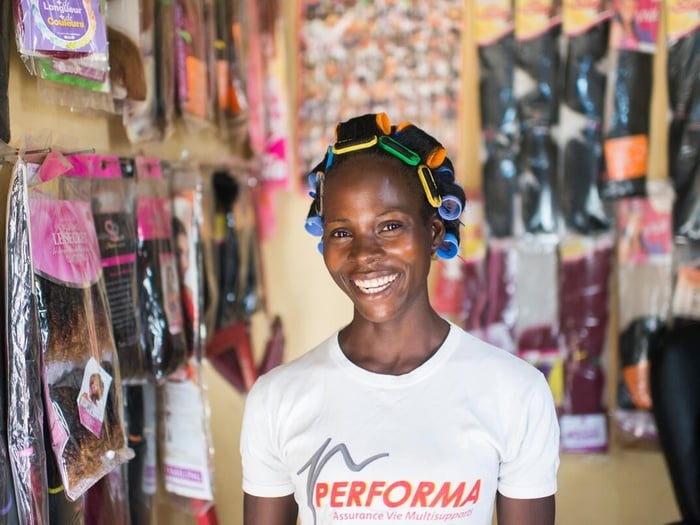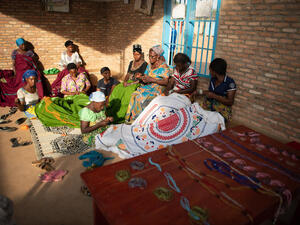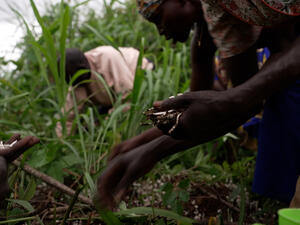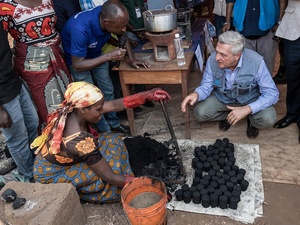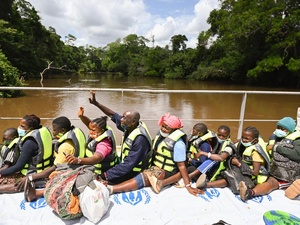Returnees
Returnees
We help people make an informed decision on when it is safe to return, aim to ensure that any returns are voluntary and dignified, and support people as they rebuild their lives.

A former refugee from Côte d'Ivoire is embraced by his aunt upon returning home.
Supporting refugees and internally displaced people to return home.
For the millions of people forced to flee, returning home concludes an often traumatic time in exile. It may happen months, years, or even decades after they left.
When it is safe to do so, UNHCR, the UN Refugee Agency, facilitates refugees and other forcibly displaced people to return home. We coordinate large-scale and individual repatriations and work to ensure any returns are voluntary, safe and dignified.
However, our work doesn’t end there. Even after refugees have crossed the border back into their home country, or internally displaced people return to their areas of origin, we continue to monitor their treatment. Working with national authorities and development partners, we help them reintegrate into their communities and make sure they can access the same services as their fellow citizens, such as housing, employment opportunities, schools and health care.
By making sure former refugees and internally displaced people are safe and can access their rights, we help ensure returns are sustainable and people are not forced to flee again.
Refugees and internally displaced people can only return home in safety once the root causes for their displacement have been addressed and lasting peace is achieved. In the first six months of 2025, 2 million refugees were able to voluntarily return to their country. A further 5 million million internally displaced people (people who are displaced within the borders of their own country) returned to their place of origin.
The term 'returnee' refers to a refugee or internally displaced person who has returned to their country or area of origin to remain there permanently. However, they are not yet fully reintegrated into their community. A returnee loses their refugee status once they return.
How does UNHCR help refugees and internally displaced people return home?
-
Coordinate voluntary and safe returns: We work with governments to promote and coordinate individual and large-scale returns. We try to ensure that returns are voluntary and dignified, and that people will be safe on their return – free from persecution, violence and the remnants of war, such as landmines. We consult with refugees and internally displaced people to understand their intentions and concerns and try to ensure return and reintegration programmes are informed by their perspectives. We may also provide transport so they can reach their area of origin safely.
-
Help people make an informed choice: Refugees and internally displaced people may find it difficult to believe it is safe to return to a place they once fled to escape conflict, widespread violence, or targeted persecution. They may also be reluctant to return because of a lack of available shelter, jobs and livelihoods and other basic services. We help them access relevant information so they can make an informed choice. We may also organize ‘go-and-see’ visits so they can visit their place of origin and assess the situation for themselves.
-
Rebuild infrastructure: In countries emerging from prolonged conflict, critical infrastructure may have been destroyed. We work with governments and development agencies to rebuild or repair schools, water systems, roads and health clinics so areas are ready for people to return to.
-
Support reintegration and access to rights: We support returnees to find housing, work and enroll their children in school. We may provide cash assistance to help them cover their initial basic needs, such as personal hygiene items and rent. We also work to ensure they have the same legal and civil-political rights as their fellow nationals. People who return are more likely to stay when they are safe, have adequate housing, can earn a living, keep their children in school and live peacefully with their neighbours.
-
Rehabilitate land when camps close: When refugee settlements and camps close, we try to return land to a condition that will best benefit the owners and people who live nearby. This may mean planting trees or simply leaving land to regenerate naturally. We also work with local communities to make sure they can continue to benefit from facilities like schools and medical clinics established with the influx of displaced people.
Helping refugees and internally displaced people return home and reintegrate requires the full commitment of the country of origin, along with the ongoing support of the international community. Working together we can ensure those who return can rebuild their lives in a safe and stable environment and are not forced to flee again.
What is voluntary repatriation?
When refugees make an informed decision to return home, free of any pressure from outside forces or their own families or communities, their return is called voluntary repatriation. When conditions are safe for voluntary return, UNHCR will promote returns and encourage refugees to learn more about the situation at home. If we do not believe it is safe, we will not promote repatriation, however, we will still support individuals who choose to spontaneously return.
Text and media 10
“When we came back in 2020, life was difficult. Then, UNHCR helped me to build this hair salon. Now, life is better. I have my own place and my kids are going to school.”
Elodie fled Côte d’Ivoire in 2011 during the civil war in the country. “When the war started, we were afraid of the gunshots – we hadn’t heard anything like that before. We started to walk, leaving all our stuff behind.”
In 2020, after the political situation in the country stabilized, she was one of thousands of Ivorian refugees who returned.
With support from a UNHCR reintegration programme, she started a small business, opening a hair salon, called ‘Seatizi’ meaning ‘peace’.
Please consider donating today
Your gift can help protect someone forced to flee their home due to conflict or persecution.


